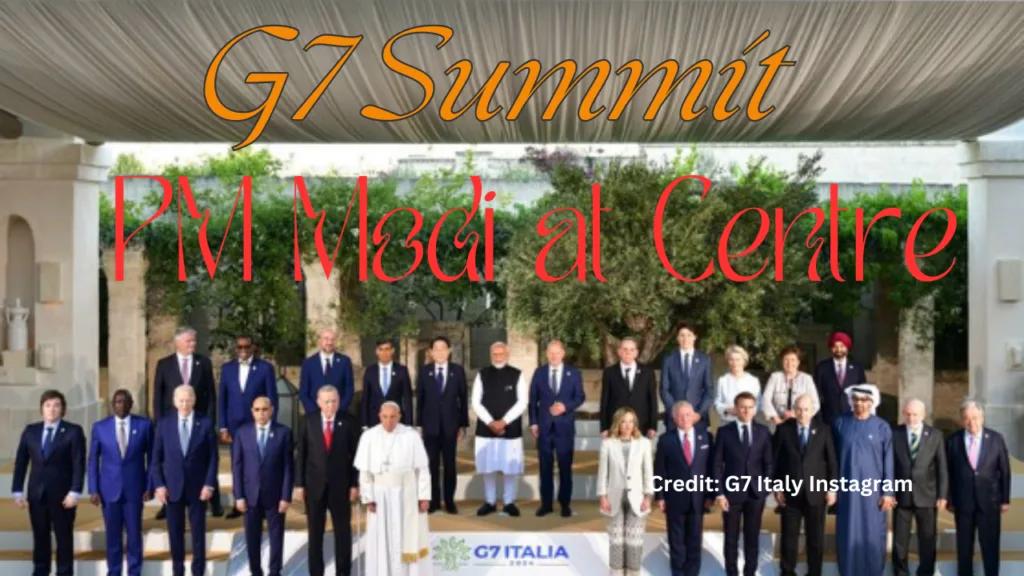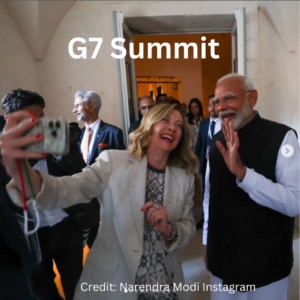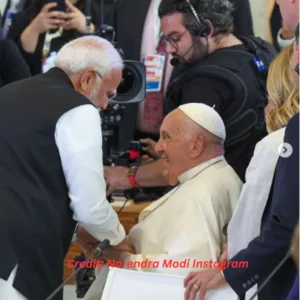G7 Summit:
World has witnessed a huge international diplomatic events when Narendra Modi went to Apulia, Italy as a Prime Minister attending a G7 Summit on 14th of June, 2024. As an Indian PM, his trip to this summit has been hailed for being his first outside the country since being re-elected, signifying India’s growing influence at the world level.
World’s developed countries make up the G7 (Canada, France, Germany, Italy, Japan, the United Kingdom and the U.S.) – a platform where major global challenges are discussed and addressed amongst others. This article will focus on Modi’s participation in the event as well as what was discussed therein touching on general issues concerned with India and global community.

Background of the G7 Summit:
Table of Contents
Made up of seven countries i.e., the UK, USA, Canada, Germany, Italy, France and Japan; the G7 was formed in the early 1975s. It began by concentrating exclusively on matters of monetary concern alone, but later broadened its perspective including such wider global issues as peace security, climate changes and public health among others. Italy had taken over the presidency and consequently hosted this year’s 50th anniversary event in Borgo Egnazia, Apulia during the period running from 13th to 15th June.
Modi’s Agenda and Key Discussions:
Modi brought up a wide range of issues that reflected India’s strategic priorities and global ambitions at the G7 summit. The most crucial ones among them included:

The Technological Era:
The 21st century is age of information technology that influences every single part of human life. Consequently, while technology empowers us to explore space, it also presents challenges such problems like cyber security. This collective effort should aim at ensuring everyone benefits from technology while at the same time getting rid of social disparities and instead improving our human nature rather than diminishing them.
This is more than just a wish; it is imperative that this happens. It necessary to democratize technology so that it becomes available for all instead of just few individuals. Further, we should utilize technology creatively and positively to build an inclusive society
AI Mission of India:
India is moving towards a brighter future by placing humans at the center of development. It is among the first countries to have come up with a National Strategy on Artificial Intelligence, and this year A.I. Mission was established based on the slogan “A.I. for All.” India is also spearheading international collaboration through its role as a founding member nation and chair of the Global Partnership for AI.
In the last G-20 Summit convened by it, India flagged up the issue of international governance on A.I., with regard to the upcoming bilateral cooperation in this area among other nations.
Energy policy:
India’s energy policy is anchored on four pillars: availability; accessibility; affordability; and acceptability. Indeed, India has exceeded its commitments under COP agreements and is on course to achieving the Net Zero target by 207.Together, let’s aim at a Green Era tomorrow.
Mission LiFE:
India has initiated Mission LiFE (Lifestyle For Environment) and launched this year’s campaign “Ek Ped Maa Ke Naam” during World Environment Day, which is dedicated to people planting trees in honor of their mothers. The project aims at turning simple tree planting into mass movement with personal feelings and global responsibility; hence I call upon all to be a part of it. My team shall provide more details about it.
Vision for 2047:
The vision of this Government is to make an Atma Nirbhar Bharat by 2047. This commitment bearing in mind international cooperation is even more important. Global uncertainties as well as tensions are impacting the developing countries.
India uses this forum to represent those countries in the best possible way while giving special attention to Africa. We are honored that the African Union was made a permanent member under India’s G-20 chairmanship. This involves all countries in the region working together on economic, social, stability including security issues.
Continuing Dialogue and Cooperation:
The ongoing meeting clearly shows that all countries’ priorities are well aligned today. On these major matters, we will have ongoing talks and collaborations with G7.

Bilateral Meetings and Strategic Partnerships:
During the summit days, Modi engaged diplomatically through holding private discussions with various leaders from different nations thus forming new or strengthening existing political alliances between India and other states. These included negotiations between Modi and Joseph Biden over enhancement of an Indo-US strategic partnership focused on such things as defense production, technology transfer and nuclear energy cooperation.
Also, there were talks with officials representing Japan or the European Union during lunch (probably among other countries) regarding some aspects bordering along lines with trade security on one hand even as they touched upon different regional security matters respectively.
An important G7 Summit, where I presented India’s perspective at the world stage. Here are highlights. pic.twitter.com/amU77yJ79Z
— Narendra Modi (@narendramodi) June 15, 2024
Implications for India:
- His Part Takes Place Before Others: His main involvement indicates India is not a small fish in international waters. That shows recognition to him globally by people who are outside this country when it comes to solving world problems.
- Economic Opportunities: Summit interactions can facilitate fresh business openings for India. Better and more relations with its trading partners from G7 can increase Indian exports while attracting foreign capital investments that may contribute significantly towards economic recovery/growth.
- Strategic Alliances: The conference provided an occasion for deeper strategic partnerships, particularly in the Indo-Pacific region. By strengthening defense and security ties with G7 nations, it is believed that regional stability will be enhanced; therefore effectively addressing geopolitical challenges.
- Climate Leadership: The fact that India takes proactive positions on issues related to climate change makes it one of the leading countries when it comes to sustainable development. This ranges from the promotion of green technologies and renewable energy sources within India’s borders to their joint use by India along with G7 partners.
Global Impact:
1. Thereby Reinforcing Multilateralism: What this means is that if Modi joins such global events, it means that multilateral actions are necessary for achieving some ends. Some of the efforts that nations should work in unison on include global health readiness and climate change programs as seen at the G7 summit.
2. Focus On Inclusive Growth: The talks highlighted inclusive growth so that all members of the society will benefit from economic recovery and digital transformation. It resonates with global efforts in reducing inequalities as well as promotion of sustainable development.
3. Enhanced South-South Cooperation: As far as G7 meeting was concerned, some believe such an attitude from India could actually promote the country’s economic interests along with helping other regions grow industrially speaking. By representing concerns of Global South states, India may be able to arouse higher levels of solidarity and cooperation among other developing nations.
Conclusion:
It was a defining moment for India’s global diplomacy services as a Prime Minister Narendra Modi took part in G7 Summit on 14th June 2024. The summit deliberations and strategic pacts agreed have far reaching implications on the country’s international status concerning some critical global challenges.
It will therefore be possible to understand our future considering economic development, environmental conservation or climactic changes through what emerged from this event while also taking into account how much we have advanced currently so far with regard to our leadership in various sectors of action globally.


1 thought on “Narendra Modi at G7 Summit 2024: Shaping Global Strategies and Influencing World Dynamics”